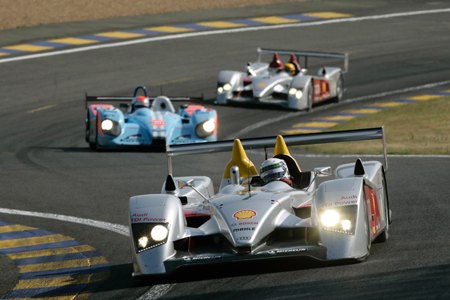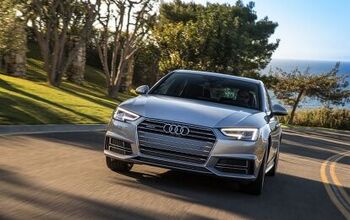Audi's Diesel Derring-Do
With little fanfare, Audi recently announced that they’ll offer their latest generation TT roadster with a diesel engine option. It’s a startling announcement. A diesel sports car? The concept is enough to make both the traditional US diesel demographic (truck buyers) and the hard core sports car fraternity (V8 and V6’ers all) snort derisively. Or not. A diesel TT could be the missing link that unites American pistonheads in a fraternity of torque and high mileage, paving the way for a wider acceptance of diesel powered passenger cars. And if anyone can do it, it’s Audi.
Earlier this year, Audi entered their diesel-engined R10 TDI into the 24 Heures de Le Mans endurance race. The R10 scored a number of firsts: the first diesel powered car to have the fastest qualifying time and the first diesel car to win Le Mans. The R10’s performance at Le Mans was so convincing that race organizers are now deciding how to level the field, so that gasoline powered cars can compete. Although these accomplishments went largely unnoticed by most Americans (if it's ain’t NASCAR, it ain’t racin’), the implications for a diesel TT are clear. A baby R10 would be a genuine coup for Ingolstadt’s US campaigners.
But first, Audi has to persuade the press and the public that the new TT is more than another pretty face. Although Audi’s Bauhaus-inspired two-door is an undisputable fashion icon, the TT never proved itself on the field of battle. High-speed stability issues plagued the car from day one. Front wheel drive questions dogged it from day two. Horsepower questions arrived on day three. By the time all that was sorted, the TT had disappeared from enthusiasts’ radar. From initial press reports, Audi might have succeeded this time. It’s a make or break proposition for the diesel version. If Audi drops an oil burner into a wannabe sports car, it’ll simply be perceived as a quirky option version for a silly car.
If, however, the TT is a “real sports car,” the diesel could elevate the car to an entirely different level: a hero/halo car. If a diesel TT delivers massive acceleration, Bimmer-baiting handling and a Porsche-beating DSG transmission, the engine’s impact will be enormous. Pistonheads and diesels lovers alike will stand up and take notice. Given this scenario, it’s hardly surprising that the company announced that the TT will receive an all-new engine. No details were provided, but we can safely assume that the new mill will be smaller than Audi’s 2.7 or 3.0-liter diesels, and more powerful than Volkswagen’s 140hp 2.0-liter four-cylinder common rail diesel.
If Audi succeeds with a diesel TT, the company will reap tremendous rewards. The Audi name plate will be associated with high performance, high mileage products– distinguishing the company’s diesels from the other foreign car marques, which use diesels for down-market thrift (Volkswagen) or up-market waft (Mercedes). As gas prices rise and clean diesel come on-stream, Audi will have the answer American consumers want: traditional V8 performance with Euro-friendly gas mileage. With every up tick in gas prices, the message will become more compelling.
Press coverage for a new vehicle is always greatest at the time of introduction; the diesel option to follow has the potential to go largely unnoticed. Audi is already working to prevent diesel distraction by shipping the R10 to the States for the American Le Mans series. We can also expect the vehicle to engage in more publicity stunts like the recent race in the UK between the R10 and a Harrier fighter jet (The R10 just barely lost).
While Audi plans to “sex-up” its diesels, Detroit is nowhere to be seen (Jeep brand excepted). It’s ironic. Truth be told, Americans really don’t want small cars; they want big cars with gas tanks they can afford to fill. Diesel technology, which has been around a long time (unlike hybrids or fuel cells), would improve the gas mileage of Detroit’s monster SUVs and extend their popularity into an age of rising gas prices. Detroit should have recognized diesel’s potential and been the first at this party, not arriving late as usual. In any case, at least one aspiring auto manufacturer understands the restorative powers of offering the right product at the right time.
More by Claude Dickson
Latest Car Reviews
Read moreLatest Product Reviews
Read moreRecent Comments
- ToolGuy TG likes price reductions.
- ToolGuy I could go for a Mustang with a Subaru powertrain. (Maybe some additional ground clearance.)
- ToolGuy Does Tim Healey care about TTAC? 😉
- ToolGuy I am slashing my food budget by 1%.
- ToolGuy TG grows skeptical about his government protecting him from bad decisions.


































Comments
Join the conversation
BarryO- I believe that the diesel engines VW is selling to DCX for the Caliber will only go into european bound Calibers. Unfortunately I don't think these will find their way to the US market. CasterOil- I've never known servicing intervals to be any shorter than for gas engines. In fact, I just did an air filter and oil change on my TDI (pumpe diesel for those of you who know what that is) and it will not need servicing again for 15000 km's (9320 miles). Thats pretty good considering that I used to change the oil on my dodge every 4 or 5 thousand miles.
The thing is that the R8 could have been faster than the R10 if they developed it more. even now with a far less inferior chassis the privateer r8's can compete with the R10. Another embarassing moment for the R10 this year was when the P2 Penske Porsche Spyders beat the P1 R10's in a AMLS race this year!